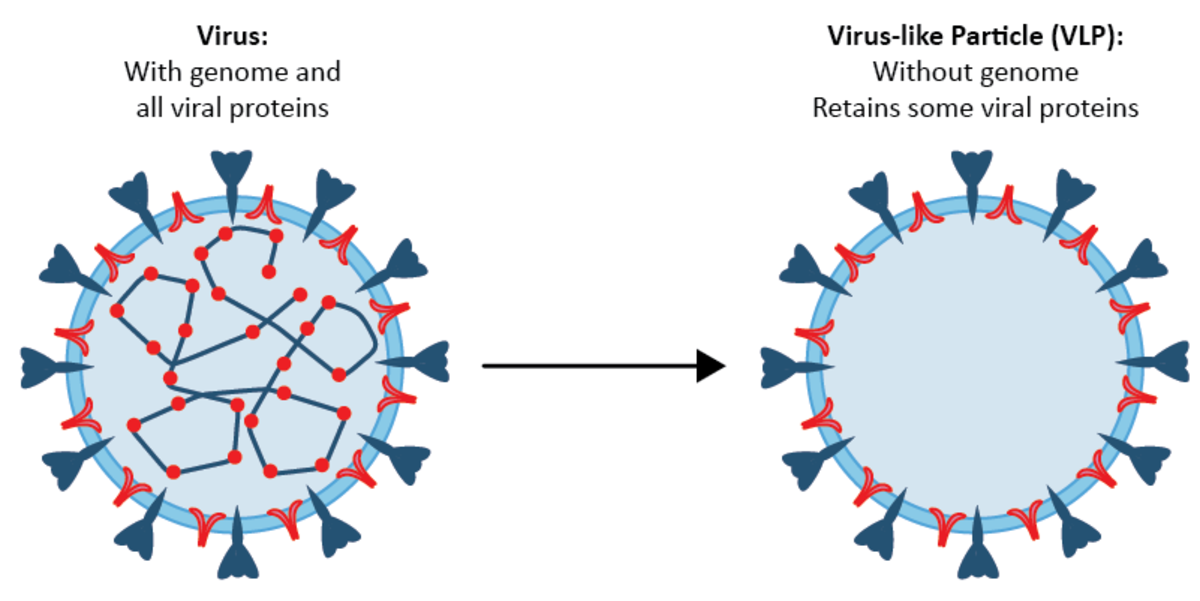What are VLPs?
VLPs are nanoscale particles that look like viruses but are not infectious. They are composed of viral proteins that self-assemble into structures similar to a virus, which can include capsid proteins or enveloped virus-like structures. This feature allows them to interact with the human immune system in a manner similar to natural viruses, making them incredibly effective as a foundation for vaccine development and drug delivery systems.

Why use VLP-displayed antigens?
VLP-displayed antigens are advantageous because they do not contain viral infectious genomes, ensuring safety in manufacturing operations. They efficiently activate both the humoral and cellular immune responses in the body, and their natural configuration of transmembrane proteins supports the discovery of differentiated antibodies.
Applications in Healthcare
Vaccines
VLPs are already making a significant impact in the vaccine industry. They have been used in successful vaccines against hepatitis B and human papillomavirus (HPV), providing a safe and effective way to prevent these infections. VLP-based vaccines are being researched for other diseases, including influenza, dengue, and even emerging pathogens like the Zika virus. Because VLPs do not carry viral genetic material, they offer a highly safe alternative to traditional vaccines, minimizing the risk of side effects.
Drug Delivery Systems
VLPs can be engineered to deliver drugs directly to target cells, improving the effectiveness of treatments while reducing side effects. This is especially useful in cancer therapy, where targeted delivery of chemotherapeutic agents can minimize damage to healthy tissues. By modifying VLPs with specific ligands, they can be directed to cancer cells, making treatment more efficient and tailored to the patient’s needs.
Gene Therapy
In gene therapy, VLPs are used as delivery vectors to transport therapeutic genes to specific cells. This approach is particularly promising for treating genetic disorders, where correcting the faulty genes can significantly improve patient outcomes. VLPs' ability to penetrate cells without triggering a strong immune response makes them ideal carriers for genetic material.
Other Applications
- Blood sample determination: ELISA
- In vivo pharmacokinetic analysis
- Antibody Immunization, Screening, Functional Characterization
- CMC method development
- Affinity determination: ELISA, SPR
The future of VLPs
The potential applications of VLPs are vast, and ongoing research continues to uncover new possibilities. Their versatility, safety, and effectiveness make them a cornerstone of modern biotechnology. Harness the power of VLPs to drive innovation in your field with our high-quality, customizable solutions designed to meet the highest standards of modern science.
Featured suppliers

Kactus Biosystems
KACTUS is a biotech company that specializes in providing top-notch protein and enzyme products and customized services for a range of fields including antibody drug discovery, immunotherapy, gene therapy, and mRNA therapeutics.
KACTUS offers a selection of VLP-displayed antigens aiding rsearch and development for antibody drugs. Their innovative protein engineering platform enables the advanced design of multi-transmembrane protein VLPs/Nanodiscs, tailored to display antigens effectively. Their product catalog includes biotinylated, non-biotinylated, and fluorescently-labeled transmembrane proteins. They are suitable for SPR, ELISA, BLI and other experimental scenarios to flexibly meet various experimental demands.
Featured products:
Additionally, KACTUS offers custom VLP/Nanodisc expression services.

ACROBiosystems
ACROBiosystems is a leading manufacturer of recombinant proteins and other critical reagents to support the development of target therapeutics, vaccines, and diagnostics.
Featured products:

Biorbyt
Biorbyt offers a wide range of reagents to meet your needs, from antibodies, ELISA kits, transfection reagents, buffers and other biochemicals.
Featured products:

Sino Biological
Sino Biological is a producer of high quality proteins, cytokines, growth factors, antibodies, ELISA kits and cDNA ORF clones. The portfolio includes more than 10’000 recombinant proteins and 19’000 antibodies, covering a broad range of life science applications such as immunology, cell and developmental biology, oncology, neuroscience, and viral & stem cell research.
